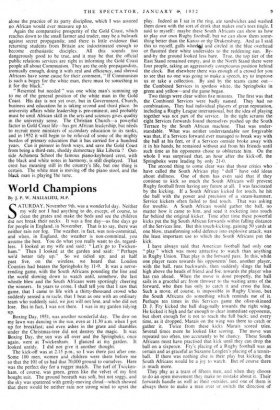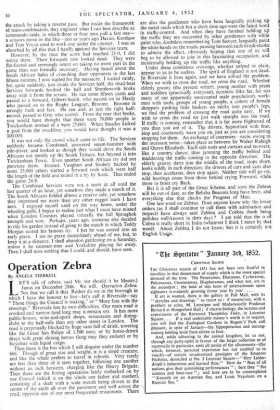World Champions
By J. P. W. MALLALIEU, M.P.
SATURDAY, November 9th, was a wonderful day. Neither my wife nor I had anything to do, except, of course, to clean the grates and make the beds and see the children did not break their necks. It was a fine day—as fine days go for.people in England, in November. That is to say, there was neither rain nor fog. The weather, in fact, was non-committal, and when, in England, the weather is non-committal, you assume the best. You do what you really want to do, regard- less. I looked at my wife and said: " Let's go to Twicken- ham." Then I looked at the garden and said: " Perhaps we'd better tidy up." So we tidied up; and at half past five, on the wireless, we heard that London Counties had beaten the Springboks by 11-9. It was a nerve- rending game, with the South Africans pounding the line and the world slowing down to watch until, somehow, the last whistle blew and the South Africans were sportingly cheering the winners. In years to come, I shall tell you that I saw that game, that I came to life with a thirty-thousand crowd who suddenly sensed a m'racle, that I beat as one with an ordinary team who suddenly said, we just will not lose, and who did not lose. But in fact, I was not there. I was in my garden tidying u Boxing Day, 1951, was another wonderful day. The dew on my lawn was dancing in the sun, even at 11.30 a.m. when I got up for breakfast; and even ashes in the grate and shambles under the Christmas-tree did not destroy the magic. It was Boxing Day, the sun was all over and the Springboks, once again, were at Twickenham. I glanced at my garden. It looked untidy. I did not give it another thought.
The kick-off was at 2.15 p.m., so I was there just after one. Some 100 men, women and children were there before me so that the 101 of us had that 70,000 ground to ourselves. Here was the perfect day for a rugger match. The turf of Twicken- ham, of course, was green, green like the velvet of my first bought suit. The ground beneath was soft, but not soggy, and the sky was spattered with gently-moving cloud—which showed that there would be neither rain nor strong wind to upset the play. Indeed as I sat in the ring, ate sandwiches and washed them down with the sort of drink that makes one's toes tingle, I said to myself: maybe these South Africans can show us how to play our own Rugby football, but we can show them some- thing better than the Karoo or the Drakensburg. And as I said this to myself, gulls wheel.; and circled in the blue overhead or flaunted their white unoTersides to the reddening sun. By- and-by the ground looked less bare. True. the top tier of the East Stand remained empty, and in the North Stand there were four people, taking an aggressively conspicuous position behind the clock. But elsewhere there was enough of a crowd for you to see that no one was going to make a speech, try to improve us or take a collection. By and by the teams came out— the Combined Services in spotless white, the Springboks in green and yellow—and the game began.
Two things were clear within five minutes. The first was that the Combined Services were badly named. They had no combination. They had individual players of great reputation, including a Rugby League international, but the idea of playing together was not part of the service. In the tight scrums the eight Services forwards found themselves pushed up the South Terrace by the South African machine. That was under- standable. What was neither understandable nor forgivable was that, if a Services forward ever managed to break way with the ball at his feet, or if a Services outside broke away with it in his hands, he remained without aid from his friends until such time as his opponents chose to obliterate him. On the whole I was surprised that, an hour after the kick-off, the Springboks were leading by only 21-0.
The second thing to come clear was that those critics who have called the South African play dull " have odd ideas about dullness. One of them has even said that if they continue to kick so much the South Africans will prevent Rugby football from having any future at all. I was fascinated by the kicking. If a South African kicked for touch, he hit the ball with the power and precision of a steam-hammer. Service kickers often failed to find touch. That was asking for trouble. A South African would gather the ball, no matter how it came to him, and send it rocketing into touch far behind the original kicker. Time after time these powerful kicks put the big South African forwards within falling distance of the Services line. But this touch-kicking, gaining 50 yards at one blow, transforming solid defence into explosive attack, was the least important use to which the South Africans put the kick.
I have always said that American football had only one " play " which was more attractive to watch than anything in Rugby Union. That play is the forward pass. In this, while one player races towards his opponents' line, another player, with the ball, runs backwards, then suddenly slings the ball high above the heads of friend and foe, towards the player who has run ahead. When the move is done properly, the ball sails in a graceful arc from thrower to the waiting arms of the forward, who then has only to catch it and cross the line. Such a move, of course, is impossible in Rugby Union, but the South Africans do something which reminds me of it. Perhaps ten times in this Services game the olive-skinned D. J. Fry kicked the ball diagonally towards the right wing. He kicked it high and far enough to clear immediate opponents, but short enough for it not to reach the full back; and every time, as it dropped, Marais on the wing was there to catch or gather it. Twice from these kicks Marais scored tries. Several times more he looked like scoring. The move was repeated too often, too accurately to be chancy. These South Africans must have practised that kick until they can drop the ball on a sixpence. Fry's placing of a Rugby football was as certain and as graceful as Suzanne Lenglen's placing of a tennis- ball. If there was nothing else in their play but kicking, the South Africans would be a joy to watch. But of course there is much more.
They ptay as a team of fifteen men, and when they choose to do an open. movement they make no mistake about it. Their forwards handle as well as their outsides, and one of them is always there to make a man over or switch the direction of the attack by taking a reverse pass. But inside the framework of team-combination, they engineer what I can- best describe as commando raids, in which three or four men pull a fast one— a scissors move or the like—just as years ago Davies, Kershaw and Tom Voyce used to work one under the counter. I was so absorbed by all this that I hardly oticed the Services team.
However, by the time the score had reached 21-0, I did notice them. Their forwards now looked dead. They were flat-footed and seemingly intent on taking no more part in the game than was formally necessary. Having heard about the South African habit of crunching their opponents in the last fifteen. minutes, I now waited for the massacre. I waited vainly, for, quite suddenly, just inside the Services half, the dead-beat Services forwards hooked the ball and Shuttleworth broke away with it from the scrum. He ran some fifteen yards and passed to a forward, Gilbert-Smith, who passed on to Hardy who passed on to the Rugby Leaguer, Broome. Broome is strongly built and fast. He ran and, at just the right half- second, passed to Gray who scored. From the roar that broke, you would have thought that were 70,000 people in Twickenham instead of a bare 25,009. When Smailes kicked a goal from the touchline, you would have thought it was a 100,000.
It was not only the crowd which came to life: The Services suddenly became Combined, answered steam-hammer with pile-driver, and looked as though they would drive the South Africans not merely up the South Terrace, but beyond it into Twickenham Town. Even another South African try did not puncture them. Instead, Vaughan and Sindery backed by some 25,000 others started a forward rush which went ,half the length of the field and ended in a try by Scott. That ended the game 24-8.
The Combined Services v1/4 ere not a team at all until the last quarter of an hour, yet somehow they made a match of it. The South Africans fielded almost a reserve side, yet somehow they impressed me more than any other rugger team I have seen. I enjoyed myself until on the way home, under the wheeling gulls, I began to realise just what I must.have missed when London Counties played virtually the full Springbok strength and won. Perhaps, years ago, someone else decided to tidy his garden instead of going to the match in which Teddy Morgan scored his famous try. 1 bet he was soured into an early grave. I see.no grave immediately ahead of me, but, to keep it at a distance, I shall abandon gardening on a Saturday, unless it be summer-time and Yorkshire playing far away. Then I shall miss nothing that I could, and should, have seen.







































 Previous page
Previous page